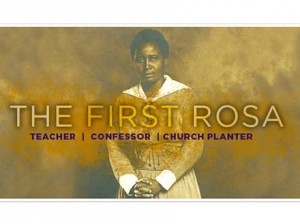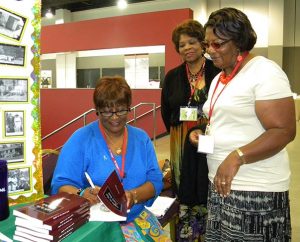By Paula Schlueter Ross
A script is ready to go, casting has begun and filming is planned for Sept. 22-26 in and around Rosebud and Selma, Ala., for the first documentary about the life of Dr. Rosa Jinsey Young — “the mother of black Lutheranism in central Alabama.”
 With a nod toward civil-rights icon Rosa Parks — who famously refused to give up her bus seat to a white passenger on Dec. 1, 1955 — the new film is titled “The First Rosa: Teacher, Confessor, Church Planter.”
With a nod toward civil-rights icon Rosa Parks — who famously refused to give up her bus seat to a white passenger on Dec. 1, 1955 — the new film is titled “The First Rosa: Teacher, Confessor, Church Planter.”
“There was another Rosa, but our Rosa was the first,” notes the documentary’s film trailer. “Rosa Parks started a civil-rights revolution. Our Rosa started a spiritual revolution.”
African-American educator Rosa Young was only 22 when she decided to open her own school for black children in the rural south in 1912. With funding from The Lutheran Church—Missouri Synod, Young ultimately started 30 schools, including what is today Concordia College Alabama, Selma. Young died in 1971 at the age of 81.
The trailer for “The First Rosa” was shown several times during the July 9-13 Black Ministry Family Convocation in Kansas City, Mo., and her great-niece, Mary Jones Wise, was on hand, signing copies of Young’s autobiography, Light in the Dark Belt. The 1951 book was edited and reprinted in 2010 by Concordia Publishing House. (Click here for more information.)
In an interview with Reporter during the convocation, Jones Wise said she’s not sure if Young — who credited God for everything she accomplished — would have been comfortable with a film about her life.
But Jones Wise’s mother, Jinsey, named for Young, would be thrilled: “This would have been the joy of her life because she always wanted the church to recognize what [Young] had done,” Jones Wise said.

When Jones Wise and her 10 siblings would visit “Miss Young,” as they addressed their great-aunt, “she would say to us, ‘What are you going to be?'” recalled Jones Wise. Her younger brother always said he would be a preacher, and Jones Wise would respond, “I’m going to be a teacher,” and so the two “became [Young’s] favorites,” she said. (That brother, Oscar, who died early in his career, did become an LCMS pastor, and Jones Wise and her two late sisters, Barbara and Esther, had teaching degrees.)
Young was “a wonderful storyteller,” and Jones Wise said she was spellbound, even at age 3, sitting and listening at her great-aunt’s feet.
During her high-school years at Alabama Lutheran Academy in Selma (which later became Concordia College Alabama), Jones Wise was a year younger than the other students and considered a bit “wild” by her great-aunt, so Young, a teacher at the school and a strict disciplinarian — kept an eagle eye on her.
Every Saturday, Jones Wise cleaned Young’s home for 50 cents. And every Saturday, Young would run her finger over the furniture and windowsills to make sure they had been dusted. “She did not want anyone to get by with anything,” Jones Wise recalled with a smile.
Even though she was “deeply committed to being a teacher,” Jones Wise says she didn’t want fellow students to know she was related to “that mean lady” whom she considered “too strict.” But Young “would always come looking” for her on campus, making sure she was staying out of trouble and harm’s way.
Today, semi-retired — with more than 40 years of teaching grades kindergarten through college behind her — Jones Wise says she is surprised to find herself so much like her great-aunt, freely sharing her message with students, family and others: “You have only so much time here. God has a purpose for your life. You need to do something with it.”
Rosa J. Young, she says now, was a woman “ahead of her time” because “she didn’t wait for permission. She said, ‘This is what needs to be done, and this is what I’m going to do.'” And so she traveled the south, starting dozens of Lutheran schools in rural, low-income communities.
Young “believed so much that education made the difference. And a Christian education was the trump,” said Jones Wise. “If you had an education, wonderful. But if you had a Christian education, you were the best that could be.”
Young never married, and Jones Wise believes that’s because her great-aunt had a mission, a focus — directly from God — that she took more seriously than anything else.
“She was not a saint,” notes Jones Wise. “But I think she gave her heart and soul to following the command in Matthew [28:19]: ‘Go ye therefore, and teach all nations.’
“For her, her ‘nation’ was her people in rural Wilcox County, Alabama.”
Jones Wise, of Minneapolis, said she plans to attend the filming of “The First Rosa” in Alabama this fall, as well as a Rosa Young celebration in Rosebud, Ala. — the site of Young’s first school — set for Sunday, Sept. 28.
In the meantime, she says she’ll be contacting relatives and friends, telling them about the documentary and encouraging them to support the project.
The LCMS has provided funding of $45,000 for the film’s initial phase, which includes filming, but some $40,000 still is needed for phase two: to purchase historic stock footage, edit the film, pay for music composition, and complete final editing.
If enough funding is received, DVDs of “The First Rosa” will be sent to all 6,100-plus LCMS congregations.
Planners hope to release the completed documentary next February, in conjunction with “Black History Month.”
Contributions to help fund the film may be sent to The Lutheran Church—Missouri Synod, P.O. Box 790089, St. Louis, MO 63179-9901 (make checks payable to “The Lutheran Church—Missouri Synod” and write “First Rosa Film Project” on the memo line).
Posted July 31, 2014



